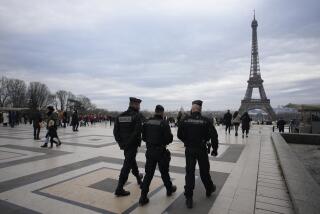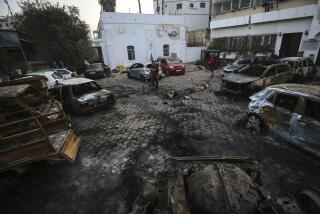Bombs Rip Paris City Hall, Other Targets in Europe
- Share via
PARIS — A bomb blasted through the ground floor of Paris’ City Hall on Monday night, only a hundred yards from an office of Premier Jacques Chirac, and killed one woman and wounded 15 other people.
No group claimed immediate responsibility for the bombing, but a witness interviewed on French television said he saw two Arab men drop a package in the crowded post office on the ground floor of the City Hall just before the blast.
The explosion, evidently the latest incident in a tense struggle between Middle East terrorists and the French government, came on a day when bombs reverberated across a number of cities in Western Europe.
The other bombs ripped away part of the wall of the West German counterintelligence headquarters in Cologne, damaged the entrance of a Dutch engineering firm in Gouda that holds cruise missile contracts and shattered the windows of the Swedish headquarters of the African National Congress in Stockholm.
None of these other European bombings, however, had the force or casualties of the Paris attack. There was no evidence that the bombings were related in any way.
The Paris explosion rocked the ornate 19th-Century Hotel de Ville, as the City Hall is known in French, while Chirac was holding a meeting of his special internal security council at the premier’s office on the other side of the Seine River in Paris. The meeting had been called to discuss the renewed threat of terrorism in the city.
Chirac, who is also mayor of Paris, rushed immediately to the City Hall, where he maintains a separate mayor’s office, to inspect the extensive damage there.
Later, Chirac, reading a statement stiffly and sternly on television, denounced terrorism as “the leprosy of modern times” and pledged that “the government will put all of its means to work (to investigate the explosion), not without consequence for those who are linked directly or indirectly to terrorism.”
The bomb was placed under a bench in the post office of the City Hall. The woman who died, a customer, was decapitated by the blast.
According to the fire department’s emergency rescue team, three other people were seriously injured and another 12, including a 3-year-old girl, suffered superficial wounds from flying glass and the effects of the bomb blast. Windows and window frames were blown out and glass was strewn onto the large public square in front of the building, which stands on the Right Bank of the Seine River, a short distance from Notre Dame Cathedral on the Ile de la Cite.
Dud on Subway Car
The French government was warned more than a week ago by an underground organization that bombings would shatter Paris once again unless three Mideastern prisoners, now jailed on terrorist charges, were released.
After the warning from the group that calls itself the Committee for Solidarity with Arab Political Prisoners and the Middle East, a bomb was planted last Thursday in a car of the Paris suburban subway line. The bomb smoked but failed to explode, averting what could have been carnage in the busy Gare de Lyon station.
The committee had claimed responsibility for a series of bombings in well-known Parisian public places at the beginning of this year that killed two people and injured more than 60 others. Although the committee’s demands have been specifically linked to the fate of the three prisoners, many analysts in Paris believe that the bombings also were conceived as a form of pressure on the French government to make concessions as it negotiates in secret for the release of seven French hostages now held by extremist Islamic fundamentalist groups in Lebanon.
According to the Paris newspaper Le Monde, the Chirac government is considering the release of one of the prisoners, a Lebanese named Georges Ibrahim Abdallah. His release, however, would infuriate the U.S. government, which regards him as responsible for the murder of a U.S. military attache and an Israeli diplomat almost four years ago.
Some French officials, however, maintain that there is not enough evidence to convict Ibrahim Abdallah, who is serving a prison sentence for illegal arms possession, of the American and Israeli murders.
The most serious of the other European explosions Monday was the blasting of the German counterintelligence offices by a remote-control car bomb in the early hours of Monday. Two extreme leftist organizations claimed responsibility for the blast, which caused extensive damage but injured no one.
The agency has provoked a good deal of controversy recently after revelations that it had put members of the anti-NATO Greens Party under surveillance.
No one claimed responsibility for the bombings at the cruise missile contractor offices in the Netherlands or the African National Congress offices in Sweden. Damage was light in both cases.
More to Read
Sign up for Essential California
The most important California stories and recommendations in your inbox every morning.
You may occasionally receive promotional content from the Los Angeles Times.












